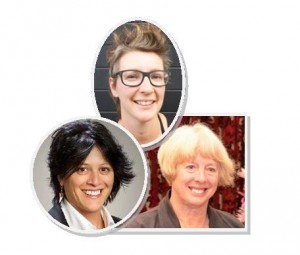
Clockwise from top: Creative leaders Jo Randerson and Deirdre Tarrant joined organisational leader Lana Simmons-Donaldson to share leadership insights at this year’s Wellington ACE program.
The Wellington ‘creative campus’ ACE (Achieving Career Excellence) women students’ leadership program had a special twist this year by collaborating with Arts on Wednesday to bring creative women entrepreneurs from the arts sector to the speaker line-up.
Dame Deirdre Tarrant (Companion of the New Zealand Order of Merit) kicked the program off with an incredibly frank and entertaining talk about her life and work as a dancer, choreographer, business owner and mentor.
The following week featured a visit from Jo Randerson, artistic director of Barbarian Theatre and award-winning New Zealand playwright. Jo talked about building a successful arts company from the ground up and generating new project opportunities through crowdfunding.
The third speaker was Massey University’s own communication leader, Lana Simmons-Donaldson, who is Massey’s Account Manager – Māori, Pasifika and New Migrants. She shared moving personal insights into leadership and perseverance, and particularly issues for Māori women leaders.
Originally developed by Professor Sarah Leberman at Manawatu, and delivered at Wellington by Associate Professor Elspeth Tilley (College of Humanities & Social Sciences) and Anna Brown (College of Creative Arts), ACE is a five-week programme for specially selected final-year women students. It explores issues for women in the workforce, such as assertiveness and gender-pay equity, and gives women students some insights into and positive strategies for handling gender-related challenges they might encounter.
“We tune the program carefully every year in response to participant feedback,” Dr Tilley said. “Last year our business students were very well catered for with fantastic organisation-based speakers, so this year we wanted to add something responsive to the needs expressed by creative arts and humanities students about work models that are not necessarily organisation-based.”
Dr Tilley said the focus for graduating students was often on employability, but it was important, particularly in the creative industries, to also foster what she called “employerability”, that is, the ability to generate projects and companies that employ others.
“Our speakers were so inspiring – they have taken risks, made sacrifices, and contributed to our culture and society in completely novel ways. Creative entrepreneurship has a set of challenges all its own, and it was great to balance that this year with the traditional organisation focus.”
The ACE program also includes exercises and activities on life-planning, assertiveness, work/life balance and managing workplace situations. Students are selected for the second-semester program based on both academic and extracurricular leadership, and receive a letter of invitation at the end of first semester. This year, the speaker portions of the program were also open to members of the public and the Wellington campus community. “These speakers are so great, we didn’t want to keep them all to ourselves,” Dr Tilley said.